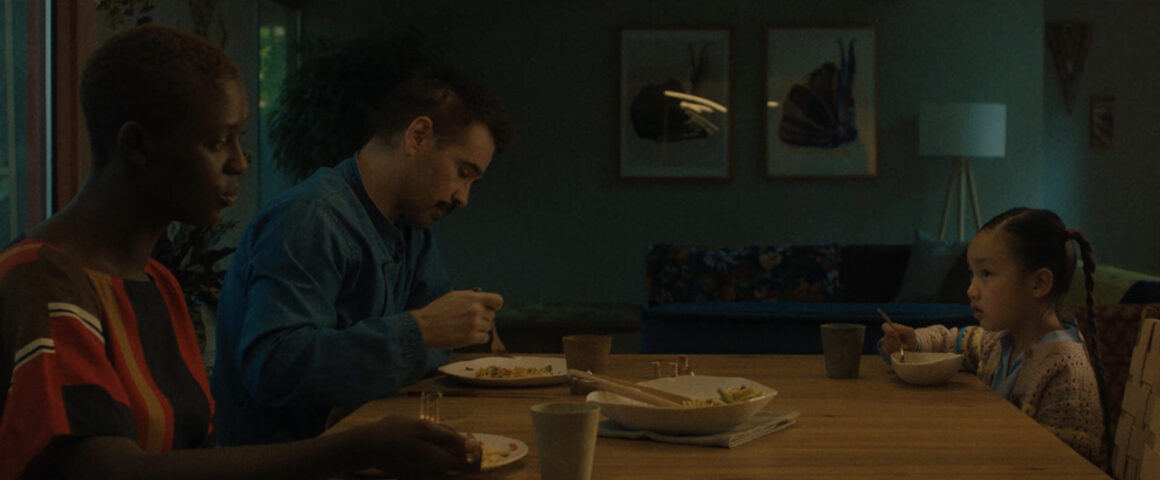“I wanna be just like a melody, just like a simple sound, like in harmony” — Glide from “All About Lily Chou-Chou”
Projections of the future in cinema have mainly foreseen a world where war, disease, and pervasive alienation are the norm. Korean-born writer/director Kogonada’s vision of the future, however, is not a dystopian world where only stragglers from a war or natural disaster remain, or a utopia where problems of climate, medicine, and crime have disappeared. In his remarkable science-fiction film After Yang, his second feature after the masterful “Columbus,” Kogonada sees a world where science is working to enhance the lives of people rather than to develop new tools of destruction.
Based on the short story by Alexander Weinstein, “Saying Goodbye to Yang,” robotics has developed to the point where families can select an android to help with specific challenges of family upbringing such as teaching children about their heritage (a cultural “techno-sapien,”) or a clone to assist in taking routine care of family members or household chores. While the stories that mark Kogonada’s first two films are vastly dissimilar, both films have the same sense of connection, intimacy, and empathy that makes them relevant and deeply affecting.
Utilizing the gorgeous cinematography of Benjamin Loeb (“Pieces of a Woman”) and Alexandra Schaller’s (“Little Voice” TV series) production design, we sense that in Yang’s world, life appears to be comfortable; the city air is clean and a sense of optimism prevails. Yang, a refurbished techno-sapien purchased from a shop that has gone out of business, has been brought into the household of Jake (Colin Farrell, “The Batman”), a tea shop owner, his wife Kyra (Jodie Turner-Smith, “Without Remorse”), and their adopted Chinese daughter Mika (Malea Emma Tjandrawidjaja, “iCarly” TV series) to school Mika about her Asian heritage. At the beginning, Yang is like a useful piece of machinery that is valuable as long as it is functioning then discarded and replaced by a new model.
Kyra is pleased that Yang is helpful in adapting Mika to her new cultural environment but that’s as far as it seems to go. Mika, however, has developed a personal bond with Yang and treats him like the brother she always wanted and feels it deeply when he suddenly ceases to function, even though she is comforted by the goldfish her father bought for her. The main focus of the film is on the attempt to repair the malfunctioning robot and the realization of the impact he had on the family. A visit to the repair shop underscores the complexity of Yang’s operating technology and the difficulty of restoring him to his former self.
With the help of Cleo (Sarita Choudhury, “And Just Like That” TV series) who works at a technology museum, a chip containing snippets of Yang’s memories is uncovered. Visualized through virtual reality glasses and displayed like a field of brightly lit pulsating stars in the heavens, the family connects with people in Yang’s previous interactions, even a possible romantic liaison with Ada, (Haley Lu Richardson, “Support the Girls”). Through these memories, the film brings us closer to what truly matters in life, but each discovery and playback of past relationships makes Yang’s absence harder to accept.
In a poignant flashback, Yang asks Jake how he got into the business of selling tea and what about tea is most important to him. Jake says it is not about the flavor but the process, the smell, the texture, and describes the feeling that tea gives him: a connection to a place and the sensation of walking in the forest after a rain. Yang knows about tea’s origins in China but wishes that this knowledge came with real memories of a time and place. In another memory, when Mika tells Yang that she was bullied in school because she was adopted, he shows her that, like the parts of two trees in an apple orchard that become one, her heritage is an important part of who she is.
Immeasurably strengthened by Aska Matsumiya’s score, an original theme by Ryuichi Sakamoto, and a lovely performance of “Glide,” from the Japanese film “All About Lily Chou-Chou,” After Yang is an Ozu-like meditation on our ability to connect with others. A work of empathy and compassion, Kogonada allows us to recognize that technology need not be a barrier to intimacy and that, despite the inevitability of having to deal with loss, joy is never far away.




'Movie Review: After Yang (2021)' has no comments